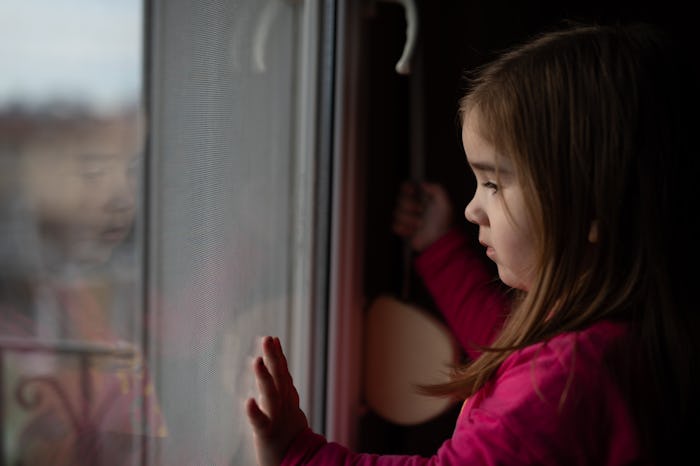Life

Here's How Your Kid's Understanding Of Time Is Affecting Their Quarantine Experience
The meaning of time is a hard concept for adults to comprehend, let alone children. (I have a 4-year-old who regularly asks “When is tomorrow?”) Time is such a confusing idea. Even the definition is impossible to explain to children: “The indefinite continued progress of existence.” Say what? Naturally, quarantine has only complicated the matter for children and adults alike. How does their understanding of time affects kids' quarantine experience?
“Luckily, especially for young ones, they haven’t really developed a sense of time yet,” psychologist Dr. Ron Stolberg tells Romper. In fact, he adds, for kids younger than the age of 7, the idea of time is not problematic at all. Young children may actually be better capable of handling quarantine isolation because of their limited understanding of how time works.
Young children only appreciate and understand what’s happening in the moment, agrees child psychologist Dr. Erin T. O'Callaghan. Because they are so present, they’re better able to navigate social isolation. Naturally, that changes as children age and become more aware.
“Older kids understand the passage of time through events,” explains Dr. O’Callaghan. That means school activities, for example: an upcoming field trip, holidays, school vacations.
Alas, most of these typical "events" are currently cancelled or postponed, making things feel even more uncertain. Plus, with both kids and parents working from home at the moment, regular routines are disrupted, further upsetting many kids.
That’s why both doctors agree that creating new routines and schedules for children (and, frankly, everyone else in the household) is the key to maintaining calm and balance right now.
“We really value schedules,” says Dr. Stolberg. “Kids thrive on parameters and limits. Knowing what to expect really reduces their anxiety.” That’s why so many elementary school teachers start the day by reviewing the calendar, days of the week, and weather with classes. This not only teaches children about seasons and the months of the year, it helps them begin to understand time.
“'Calendering' is something parents can do at home, and it doesn’t have to take more than 3 minutes,” recommends Dr. O’Callaghan. “While you’re fixing your coffee, take kids to the fridge — you can buy one of those magnetic calendars online or make one out of construction paper — and mark events on calendar.” Let kids cross off days or count down to some fun event.
Dr. O’Callaghan also suggests including activities that the whole family can look forward to. “Have Friday movie night and order pizza,” she says. “That helps them with understanding.”
It can also help kids to understand the difference between work and play time.
For older children, Dr. Stolberg says, dealing with time is a bit trickier.
“I’m more worried about 15-year-olds than 9-year-olds,” he says. “They’re dreaming about what they were going to do with their freedom, getting driver’s licenses and seeing friends. Kids up until 15 are really highly scheduled with schools activities like sports teams clubs.” The loss of those things can be difficult. That's why Dr. Stolberg says posting a schedule with expectations in writing is just as important for older children as it is for younger ones.
“They still need play time and free time and socializing,” he says. And just because your kids are older doesn’t mean they don't need your help in making those things happen (if they'll let you help, that is). Encourage kids to connect with friends on FaceTime or even online games.
Another thing older kids need? A purpose. “Give them a say in how the family gets through,” suggests Dr. Stolberg. “Give them opportunities to be problem solvers and be effective.” This is a time to help kids learn some essential survival skills for when they’ve left the nest. “Times like this can help make them much more resilient down the road. Bad things happen and how do you respond? We really want to show kids that even in this really bad time, they’ve got skills to get through it.”
But the most important thing you can do right now for your kids, says Dr. O’Callaghan, is to find fun ways to pass the time together.
“That old saying ‘time flies when you’re having fun' is true," he says. "We have actual research to demonstrate that that’s true. When we’re having fun, and engaged in a pleasurable activity — it could be a work activity you're enjoying on an intellectual level, or a science fair project for a teen — we perceive time as moving quicker. By contrast, when we’re bored or when we’re ruminating or obsessing about the news, media, virus... time is going more slowly. For kids, it’s the same thing; family projects can actually help them.”
So to help your kids process this time, make the most of it with a family jigsaw puzzle, gardening project, or even a round of Animal Crossing. As the doctors say, it’ll make quarantine go faster, and it'll make your family bonds even stronger.
Experts:
Dr. Erin T. O'Callaghan, child psychologist and Director and Associate Professor for the California School of Professional Psychology at Alliant International Universit
Dr. Ron Stolberg, a licensed Clinical Psychologist and co-author of "Teaching Kids to Think: Raising Confident, Independent, and Thoughtful Children in an Age of Instant Gratification"